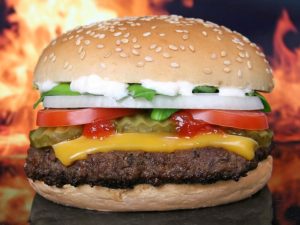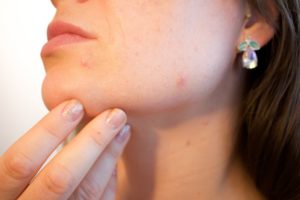Should you go Gluten Free or Is It a Fad?
I have read many articles stating why we need to eat whole grains and then these articles go on to say we need to be eating wheat unless you are celiac or have a gluten sensitivity. They state that we miss out on vital nutrients if we don’t eat wheat and other gluten containing grains such as rye, barley and spelt.
These articles are misleading and don’t do you any favors.
Should you go gluten free if you do not have celiac disease or a gluten sensitivity? Read on and I will let you decide the answer to that question.
Gluten, Wheat, Your Body
Nutrient Deficient and Processed
When articles supporting gluten and wheat talk about why you should consume it, they always say “Whole grains”. This is important. Yes, whole grains contain important nutrients such as iron, B-6, folate, and magnesium.
Who reading this eats wheat as a whole grain, that you can actually see? Didn’t think so?
No, you eat wheat and other gluten containing products in a highly refined and processed form. When you consume it in this form, such as in your bread, bagels, pizza and pasta, you are consuming the starchy part of the grain. The nutrient dense portion along with the protein and the fiber have been removed.
What you are left with is a nutrient deficient starchy product that raises your blood sugar rapidly since now it does not have the fiber, nutrients and protein to slow down the process when it enters the blood stream.
But wait, the package mentions all these vitamins! Read the label closely. It will say “enriched with” or “fortified with”. To be clear, enrichment means that nutrients that have been lost in processing have been added back in. Fortified means added nutrients that the food never contained in the first place.
Why would they need to add these nutrients into the product if it is such a healthy product to begin with? They add it back in(enrichment) because the product is so refined that is has been stripped of all its original nutrients. And do you think they are adding nutrients back in, in a high quality and absorbable form? No, they add back synthetic forms of these nutrients. For instance, they may add back in folic acid. This is the synthetic form of folate and not as absorbable.
The argument that you need whole grains to reap the benefit of vital nutrients is false. Instead, eliminate these processed, packaged foods from the diet (even GF options) and instead add in more whole foods.
Whole grains are not the only source of B-6, magnesium, iron and folate to name a few. You can get these mineral and vitamins from other, much healthier sources, such as fruits, vegetables, leafy greens, beans, legumes, quinoa, teff, steel cut oats, nuts and seeds and grass fed, organic or wild caught meats, poultry and fish.
Nutrients found in its whole food form is the way mother nature intended us to absorb and utilize our nutrients. For instance, in an apple you have vitamins, minerals, macronutrients, fiber and phytonutrients in this perfect form. You don’t get that from a processed and packaged product.
Trust me, your diet is not going to be deficient if you skip the bagels, donuts, crackers, pasta and bread! In fact, your body is going to thank you once that blood sugar stabilizes, and you replace the nutrient deficient, highly empty caloric foods with healthier options.
Chemicals/Heavily Sprayed Crop
Wheat is not a GMO crop. Many people will state that wheat is a GMO crop, and this is not true. However, wheat, along with barley, oats and edible beans, is a heavily sprayed crop right before harvest. Many of you avoid GMO foods because they are heavily sprayed, wheat does fall into this category.
What you don’t see can still hurt you. The glyphosate that is spayed on the wheat crop is now classified as a probable carcinogen according to the World Health Organization. California also classifies glyphosate as a probable carcinogen.
If that is not reason enough to avoid wheat, then also know that research is showing that glyphosate can act as an endocrine disruptor and it can kill gut bacteria and lead to leaky gut syndrome.
While the glyphosate residue in your bread may be small, think of the toxic load on your body over time when you consume wheat daily for years and years. Add on top of that all the other ways that you are exposed to toxins daily. Your body and your liver may have a difficult time keeping up to remove these toxins from your body. You are going to read elsewhere that the amount of glyphosate residue in your food is safe, but they never look at this in addition to the other toxins you are exposed to such as from water, soil, air and other foods. Studies only look at the burden of one product, one chemical.
Chlorpyrifos is a organophosphate insecticide that can disrupt brain development and cause brain damage, reduced IQ, neurological issues and aggressiveness in children. This chemical is used in crops such as wheat and corn and non-organic fruits and vegetables.
For this reason, I think everyone should at the very least, reduce the amount of gluten containing foods they consume to reduce this toxin overload. Not every farm sprays wheat and barley right before harvest. If you order flour from a direct source, ask them.
Blood Sugar Disruptor
Gluten containing products can cause your blood sugar to soar and then crash. Gluten Free foods can be just as bad for your blood sugar as they are also made from refined carbohydrates. To support a balanced blood sugar, minimize or greatly reduce the amount of processed and refined products that you eat. When you eat foods or meals that are high in simple and refined carbs with little to none protein or healthy fats in the mix, then your blood sugar can surge from these carbs that convert to sugar once they enter the bloodstream. Eat carbs in the form of whole beans and legumes, vegetables and fruit.
Wheat contains amylopectin A, a complex carb. Having two slices of bread can increase your blood sugar higher than it would if you ingested 6 tablespoons of sugar. At the very least, take off the top of bottom to your sandwich or have one half a bagel rather than a whole one.
Addictive and Increases Your Appetite
Yes, gluten containing products (mostly from wheat) are highly addictive! It is right up there with processed sugar. Every time you consume gluten containing foods such as a bagel it lights up your dopamine receptor just like sugar and cocaine does. When you come down from your processed grain rush, guess what, yup, just like cocaine or sugar, you want more to get that dopamine rush again.
Obviously, you don’t get the same high as you see in a heroin or cocaine addict. The addiction is instead that it makes you hungry and hungry for more wheat, starchy refined gluten containing foods. This is due to a protein in wheat called gliadin (an opioid). It was altered back in the 1970’s to increase yield. This shift in amino acids produced not only high yield but also a food that can increase your appetite!
If you” have to have” white flour products on a regular daily basis, consider the fact that you may be addicted to these foods.
Are There Health Reasons Other for Avoiding Gluten?
Just because you do not have stomach issues, does not mean you do not have a reaction to gluten. Look at the list below to see some more common conditions that can be caused or exacerbated by gluten.
Testing is available for gluten sensitivity. But doing a trial elimination of gluten for 30 days can help to see if any of your health issues improve.
Going Gluten Free may help with the following conditions
- Autism
- Anxiety
- Depression
- ADHD
- Skin Issues
- Autoimmune conditions
- IBS
- Migraines/headaches
- Obesity
- Diabetes
- Joint Pain/arthritis
- Fatigue
What To Do If You Don’t Want To Give Up Gluten. The 80/20 Rule
It is not easy to give up entirely for most people as gluten is in everything now. If you are traveling, out to eat or at someone else’s house, it can be difficult to avoid it. Therefore the 80/20 rule works best.
For instance, Monday through Friday you avoid gluten and on Saturday night you have pizza and on Sunday night you have pasta, or you only have one piece of toast at breakfast and no gluten the rest of the day.
Once you stick with the 80/20 rule long enough, you will start to notice that when you avoid the refined processed foods you don’t feel as bloated or you notice you have more energy. For many, you just “feel better” but can’t really pinpoint why. Being prepared always helps. Keep gluten free snacks,such as nuts and seeds and whole foods protein bars in the car, in your purse, in your desk at work. Travel with your own snacks such as protein bar options and bags of nuts and seeds. When ordering your sandwich or burger, ask for a lettuce wrap.
Don’t Replace with Gluten Free Products
When you take out the gluten containing processed foods, replace them with whole foods that will fill you up, give you energy and balance your blood sugar. These foods include more protein and fats and whole food carbs.
Do not replace your gluten containing bread, pasta, bagels and cookies with gluten free options. Yes, there are many gluten free options out there and they can be useful for on occasion but don’t make these a daily habit. These products contain a high amount of sugar and non- gluten starches, so they will raise your blood sugar just as much and leave you to crave more. Reserve these for treats as part of your 80/20 rule.
Bottom Line
If you consume wheat based refined products or even gluten free processed products such as cookies, donuts, bread, pasta and pastries, you are not eating them for their health benefits but for pure pleasure or because you are addicted.
There is nothing wrong with that, but minimize this to 20% of your diet. If you are not able to reduce the amount because it is so addictive for you, then you may need to remove processed gluten products long term until you break the vicious cycle.
If you want to consume whole grains, then do so. This means the grain you can see such as in rice, quinoa, millet and teff.
Going off the gluten is not easy since it can be so addictive. Seek the help of a holistic nutrition professional who can guide you and who knows some tricks in how to reduce cravings and the “flu like” symptoms when you remove it.
Sources
https://www.ncbi.nlm.nih.gov/pmc/articles/PMC3257612/
https://www.ecowatch.com/why-is-glyphosate-sprayed-on-crops-right-before-harvest-1882187755.html
http://www.nature.com/doifinder/10.1038/nature.2015.17181
https://articles.mercola.com/sites/articles/archive/2017/11/21/chlorpyrifos-found-in-newborns.aspx
If you are sick and tired of feeling sick, tired, fatigued, depressed, anxious and more and have given up hope then Karen’s simple, effective, individualized and sustainable approach may be what you need.
Karen Brennan, MSW, CNC, Board Certified in Holistic Nutrition and Herbalist is the author of Tru Foods Depression Free Nutrition Guide; How Food Supplements and herbs can be used to lift your mood and If Life is So Good, Then Why AM I Still Depressed? Discover the root cause for your depression and learn what to do to feel better and owner of Tru Foods Nutrition Services, LLC.
For more information visit www.trufoodsnutrition.com
Want more information, like her fb page here
As a nutrition professional, Karen does not treat, cure nor diagnose. This information is for educational purposes only.







Leave A Comment
You must be logged in to post a comment.